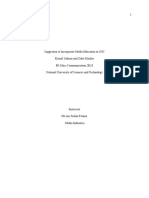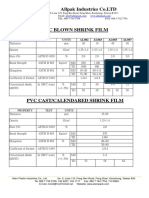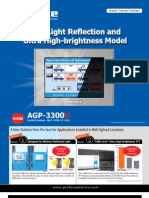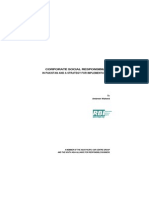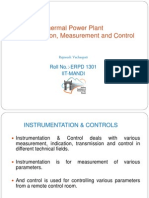0 ratings0% found this document useful (0 votes)
Propaganda and It's Affects in A Modern Society
Propaganda and It's Affects in A Modern Society
Uploaded by
Jasmin SabicPropaganda takes many forms and can significantly influence individuals and societies by shaping public opinion and manipulating emotions. It has the potential to impact decision-making, deepen societal divisions, and hinder constructive dialogue. To address the challenges posed by propaganda, governments, educators and media outlets must promote media literacy, critical thinking, fact-checking, transparency and ethical journalism. Understanding how propaganda spreads online and balancing free speech with accurate information are also vital considerations in modern society.
Copyright:
© All Rights Reserved
Available Formats
Download as DOCX, PDF, TXT or read online from Scribd
Download as docx, pdf, or txt
Propaganda and It's Affects in A Modern Society
Propaganda and It's Affects in A Modern Society
Uploaded by
Jasmin Sabic0 ratings0% found this document useful (0 votes)
Propaganda takes many forms and can significantly influence individuals and societies by shaping public opinion and manipulating emotions. It has the potential to impact decision-making, deepen societal divisions, and hinder constructive dialogue. To address the challenges posed by propaganda, governments, educators and media outlets must promote media literacy, critical thinking, fact-checking, transparency and ethical journalism. Understanding how propaganda spreads online and balancing free speech with accurate information are also vital considerations in modern society.
Original Description:
Propaganda and it's affects in a modern society
Original Title
Propaganda and it's affects in a modern society
Copyright
© © All Rights Reserved
Available Formats
DOCX, PDF, TXT or read online from Scribd
Share this document
Did you find this document useful?
Is this content inappropriate?
Propaganda takes many forms and can significantly influence individuals and societies by shaping public opinion and manipulating emotions. It has the potential to impact decision-making, deepen societal divisions, and hinder constructive dialogue. To address the challenges posed by propaganda, governments, educators and media outlets must promote media literacy, critical thinking, fact-checking, transparency and ethical journalism. Understanding how propaganda spreads online and balancing free speech with accurate information are also vital considerations in modern society.
Copyright:
© All Rights Reserved
Available Formats
Download as DOCX, PDF, TXT or read online from Scribd
Download as docx, pdf, or txt
0 ratings0% found this document useful (0 votes)
Propaganda and It's Affects in A Modern Society
Propaganda and It's Affects in A Modern Society
Uploaded by
Jasmin SabicPropaganda takes many forms and can significantly influence individuals and societies by shaping public opinion and manipulating emotions. It has the potential to impact decision-making, deepen societal divisions, and hinder constructive dialogue. To address the challenges posed by propaganda, governments, educators and media outlets must promote media literacy, critical thinking, fact-checking, transparency and ethical journalism. Understanding how propaganda spreads online and balancing free speech with accurate information are also vital considerations in modern society.
Copyright:
© All Rights Reserved
Available Formats
Download as DOCX, PDF, TXT or read online from Scribd
Download as docx, pdf, or txt
You are on page 1/ 1
Title: The Impact of Propaganda in Modern Society
Introduction: Propaganda, defined as the dissemination of information to promote a particular
viewpoint, can significantly influence individuals and societies. In today's interconnected
world, where information spreads rapidly through various channels, understanding the effects
of propaganda is crucial.
1. Definition and Forms of Propaganda: Propaganda takes many forms, including
political campaigns, advertising, social media, and news coverage. It often employs
persuasive techniques to shape public opinion, often with a specific agenda.
2. Shaping Public Opinion: One of the primary effects of propaganda is its ability to
shape public opinion. By strategically presenting information, propaganda can
influence how people perceive issues, events, or individuals. This can impact voting
behavior, public attitudes, and societal norms.
3. Manipulating Emotions: Propaganda frequently targets emotions, aiming to evoke
specific feelings to gain support or create opposition. Appeals to fear, patriotism, or
empathy can sway public sentiment and contribute to a polarized society.
4. Impact on Decision-Making: In modern society, where individuals are bombarded
with information, propaganda can impact decision-making. Whether it's a consumer
choice, political affiliation, or social stance, exposure to persuasive messaging can
steer individuals toward certain beliefs or actions.
5. Polarization and Division: Propaganda has the potential to deepen societal divisions.
When different groups are exposed to conflicting narratives, it can lead to polarization
and a lack of consensus on critical issues. This division may hinder constructive
dialogue and compromise.
6. Media Literacy and Critical Thinking: To mitigate the negative effects of propaganda,
fostering media literacy and critical thinking skills is essential. Educating individuals
on how to evaluate information sources, fact-check, and discern biased content can
empower them to make informed decisions.
7. Combating Misinformation: Governments, educators, and media outlets play a crucial
role in combating misinformation and propaganda. Implementing policies that
promote transparency, fact-checking, and ethical journalism can contribute to a more
informed and resilient society.
8. The Role of Technology: In the digital age, technology plays a pivotal role in the
spread of propaganda. Social media platforms, in particular, amplify the reach of
persuasive messages. Understanding the dynamics of online information dissemination
is vital for addressing the challenges posed by digital propaganda.
9. Ethical Considerations: The ethical implications of propaganda warrant careful
consideration. Balancing the right to free speech with the responsibility to provide
accurate and unbiased information is a complex challenge that societies must grapple
with to maintain democratic principles.
Conclusion: In conclusion, the impact of propaganda in modern society is profound,
influencing public opinion, decision-making, and societal cohesion. Recognizing its effects
and implementing measures to promote critical thinking and ethical information
dissemination are essential for fostering a well-informed and resilient society.
You might also like
- Principles of mass communication (M.A 1st Sem)No ratings yetPrinciples of mass communication (M.A 1st Sem)71 pages
- Five Important Reasons Why Being a Media Literate Individual is Crucial in _2024No ratings yetFive Important Reasons Why Being a Media Literate Individual is Crucial in _20241 page
- The Role of Social Media in Shaping Public OpinionNo ratings yetThe Role of Social Media in Shaping Public Opinion2 pages
- Media Plays A Vital Role in Shaping The Development of A CountryNo ratings yetMedia Plays A Vital Role in Shaping The Development of A Country2 pages
- How Can Conflicts Be Affected by Social Media?No ratings yetHow Can Conflicts Be Affected by Social Media?3 pages
- Ahmad Raza 717 The Impact of Social Media On Political DiscourseNo ratings yetAhmad Raza 717 The Impact of Social Media On Political Discourse9 pages
- Effects of Media On Society and Ethical FrameworksNo ratings yetEffects of Media On Society and Ethical Frameworks18 pages
- The Role of Social Media in Modern SocietyNo ratings yetThe Role of Social Media in Modern Society1 page
- Ethics of Social Media and Public CommunicationNo ratings yetEthics of Social Media and Public Communication5 pages
- Introduction To Public Opinion and Propaganda: by Jhunrey SolisNo ratings yetIntroduction To Public Opinion and Propaganda: by Jhunrey Solis12 pages
- The Role of Media in Shaping Public Opinion PDFNo ratings yetThe Role of Media in Shaping Public Opinion PDF1 page
- The Impact of Technology on Modern EducationNo ratings yetThe Impact of Technology on Modern Education1 page
- The Role of Media in Shaping Public Opinion PDFNo ratings yetThe Role of Media in Shaping Public Opinion PDF2 pages
- The Influence of Social Media on Political PolarizationNo ratings yetThe Influence of Social Media on Political Polarization1 page
- Decoding the Truth; A Guide to Critical Media LiteracyNo ratings yetDecoding the Truth; A Guide to Critical Media Literacy62 pages
- The Role of Social Media in Modern Political CampaignsNo ratings yetThe Role of Social Media in Modern Political Campaigns1 page
- (M Fahad) The Impact of Social Media On Political DiscourseNo ratings yet(M Fahad) The Impact of Social Media On Political Discourse8 pages
- Readings in The Philippine History L1-3No ratings yetReadings in The Philippine History L1-311 pages
- The Great Tangshan Earthquake of 1976 Volume 3No ratings yetThe Great Tangshan Earthquake of 1976 Volume 3871 pages
- 2.A Scientist Dreams of Snakes, Discovers BenzeneNo ratings yet2.A Scientist Dreams of Snakes, Discovers Benzene7 pages
- E.gilson The Unity of Philosophical ExperienceNo ratings yetE.gilson The Unity of Philosophical Experience341 pages
- An Introduction To Software Engineering: ©ian Sommerville 2004 Slide 1No ratings yetAn Introduction To Software Engineering: ©ian Sommerville 2004 Slide 131 pages
- SE-307-CHAPTER 1 Engineering Economic DecisionsNo ratings yetSE-307-CHAPTER 1 Engineering Economic Decisions16 pages
- Allpak Industries Co - LTD: Property: AL082 AL083 AL085 AL087No ratings yetAllpak Industries Co - LTD: Property: AL082 AL083 AL085 AL0873 pages
- Surviving Sepsis Campaign: International Guidelines For Management of Sepsis and Septic Shock: 2016No ratings yetSurviving Sepsis Campaign: International Guidelines For Management of Sepsis and Septic Shock: 201641 pages
- Rapid7 Research The Attackers DictionaryNo ratings yetRapid7 Research The Attackers Dictionary26 pages
- Tsbie: Intermediate Public Examinations Results - 2019No ratings yetTsbie: Intermediate Public Examinations Results - 20191 page
- Ambreen Rbi - CSR Perspective From PakistanNo ratings yetAmbreen Rbi - CSR Perspective From Pakistan75 pages
- SRLPN Power Plant Measurement and InstrumentationNo ratings yetSRLPN Power Plant Measurement and Instrumentation77 pages



















































